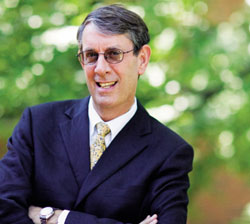Thirty-six percent of undergraduates study abroad.

Van Lengen collaborated with architect Joel
Sanders and media artist Ben Rubin on an
installation with the Vitra Design Museum
in Germany. Entitled "Mixhouse," the work
was included in a traveling exhibition, "Open
House," in 2006. The image explores the
relationship between sound and vision in the
context of domestic architecture.
In 1785, Thomas Jefferson left for Europe as minister to France, an experience that transformed his life. It prepared him for service as secretary of state and president. It shaped his views of the curriculum he devised for the University of Virginia, where he insisted students learn modern languages as well as ancient ones. And it formed his tastes and gave him the range of acquaintance that led to his inviting Europe's leading statesmen, artists, and scientists to join him at Monticello.
The effect of time spent overseas has no less impact today than it did in Jefferson's time, and, if anything, it is more important, thanks to advances in technology that have made our world a much smaller place. Everyday people, not just the country's leading officials, find themselves active participants in a global world.
A World-Wise Curriculum
As part of the University's 2020 initiative, the University made a commitment to enlarging and enriching its international activities. Figures released this year from the Institute of International Education show that we have made significant progress. Thirty-six percent of undergraduates study abroad, placing the University eighth among the nation's top twenty doctoral and research institutions.
The commitment to create global experiences for students is now a general practice around the University. For instance, the School of Law has instituted an exchange program for third-year students with institutions in France, Germany, England, Australia, and New Zealand. The Law School also admits up to forty foreign students a year, drawn by its Master in Laws in the Judicial Process Program.
A similar effort is under way in the School of Engineering. In the past, engineering students have been hesitant to study abroad because of the large number of required courses they must take and the difficulty finding appropriate equivalents at foreign institutions. Students typically responded by taking their required courses at the University, and reserving their electives for overseas study. One objective of the recent student and faculty exchange programs developed with the National Taipei University of Technology and the Shanghai Jiao Tong University is to give U.Va. students the ability to satisfy the engineering core curriculum while studying abroad.
The Darden School of Business has taken a different approach to incorporating an overseas trip within a highly structured curriculum. It has created a series of two-week Graduate Business Experiences in Argentina, Bahrain, China, India, Mexico, Romania, Spain, South Africa, and Sweden. Students visit local businesses, joint ventures, and multinational companies and meet with government officials and local leaders to gain a better understanding of the economic and social forces that shape each country's business environment.

academic dean for Semester at Sea.
A Semester at Sea
This year, the University entered into a new partnership with the Institute for Shipboard Education to sponsor Semester at Sea. Fall and spring semester programs begin in 2006-07, with approximately 670 students traveling to such countries as Japan, China, India, Egypt, Spain, South Africa, and Brazil on the MV Explorer. A shorter trip with slightly fewer students is held during the summer sessions. David Gies, Commonwealth Professor of Spanish, has been named the University's first dean for a Semester at Sea voyage and will direct the 2007 summer program. Professor Gies is responsible for designing a new curriculum for the program as well as hiring faculty.
Embracing Cultural Communities
The University has long understood the importance of preparing students for overseas work. This year, the first and oldest residential language house at U.Va., the French House, celebrated its twentieth anniversary. Under the auspices of director Christine Zunz, the Maison Française has brought a number of important French cultural figures and historians to Charlottesville, including Emmanuel Le Roy Ladurie, and Jacques Barzun. This year, it presented the University's first French Film Festival, with funding from the French Ministry of Culture.
In addition to the Maison Française, the University maintains the Russian House, the Max Kade German House, La Casa Bolívar, and the Shea House for students learning Arabic, Chinese, Hindi-Urdu, Italian, Japanese, or Persian. Students can also live at the International Residential College, which is dedicated to intellectual exchange and learning among students and scholars of all nations, races, and cultures. The college includes the Munford, Gwathmey, Lewis, and Hoxton houses and can accommodate 320 students.
Members of a Global Research Enterprise
The University is home to distinguished regional studies programs covering Africa, the Middle East, Latin America, Russia and Eastern Europe, and Asia. The activities of the East Asia Center, which entered its fourth decade this year, illustrate the importance of these centers. Under the direction of history professor Bradly W. Reed, the East Asia Center takes an interdisciplinary approach, offering courses taught by more than thirty faculty and two graduate degree programs. To complement its on-Grounds curriculum, the center provides students with study abroad programs in Shanghai, Tibet, and Beijing. It has also built an impressive East Asian collection, with holdings of more than 33,000 Chinese, Japanese, and Korean monographs, as well as 10,000 volumes of Chinese classics, 100 Chinese and Japanese periodicals, and a multitude of Asia-related and Asian-language films.
